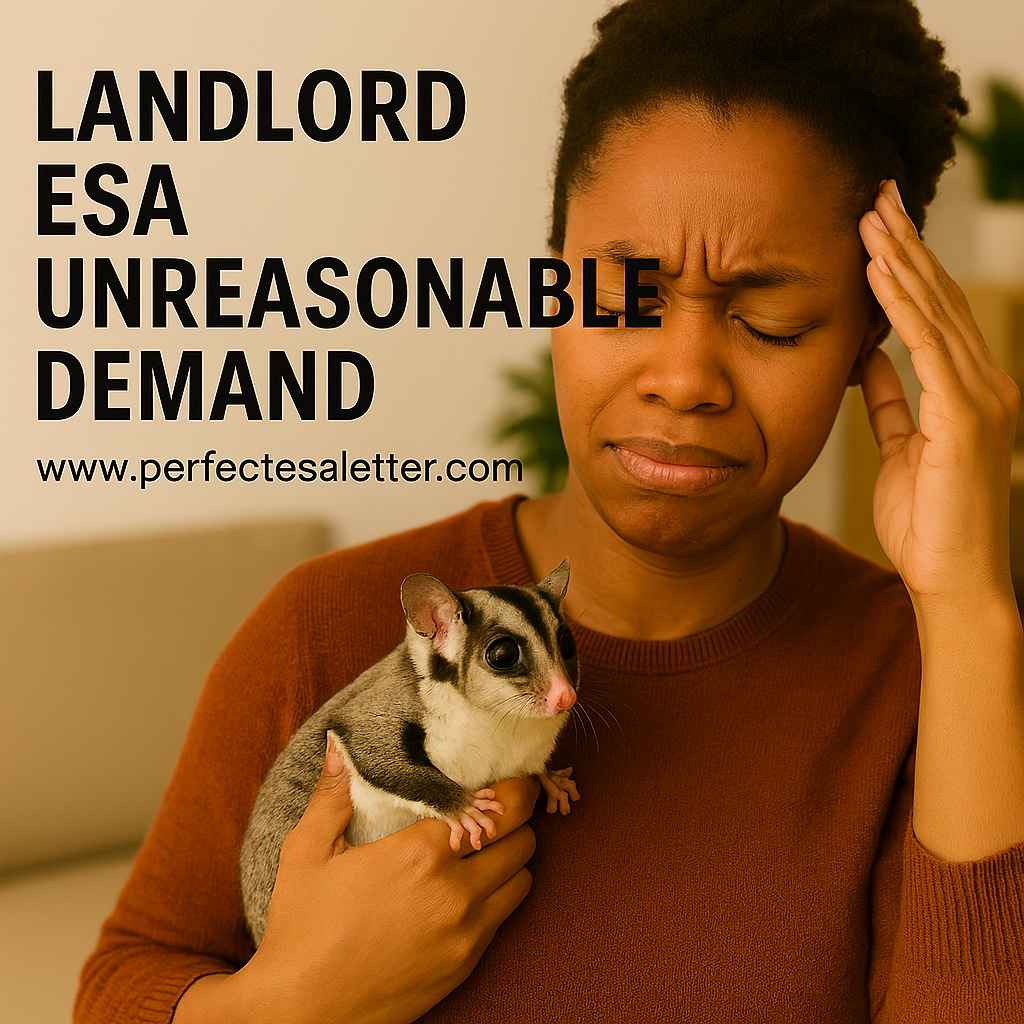How to Handle Landlord ESA Unreasonable Demands
Article
Introduction
Emotional Support Animals (ESAs) are crucial for individuals managing mental or emotional health conditions. Federal law, particularly the Fair Housing Act (FHA), guarantees ESA tenants the right to reasonable accommodation.
Despite these protections, some landlords make unreasonable demands that go beyond legal boundaries, often attempting to restrict or penalize ESA tenants. Understanding what qualifies as an unreasonable demand, your rights, and how to respond is essential for protecting both your housing and your ESA.
”Get Yours Now!
Don’t wait until a landlord or airline tells you “no pets allowed.” Protect your rights today.
Please fill out this form and our team wil contact you ASAP.
Complete your assessment in minutes , get approved by a licensed professional, and receive your letter within 24 hours.
What Is a Landlord ESA Unreasonable Demand?
An unreasonable demand occurs when a landlord requests actions, restrictions, or fees from ESA tenants that exceed legal requirements. Examples include:
- Excessive Documentation Requests
- Demanding multiple ESA letters, repeated medical proof, or unnecessary personal information.
- Unjustified Fees or Deposits
- Charging pet deposits, pet rent, or additional cleaning fees despite valid ESA documentation.
- Overly Restrictive Rules
- Prohibiting the ESA from common areas, limiting ESA size or breed against federal law, or restricting access beyond reasonable accommodation.
- Threats or Retaliation
- Issuing threats of eviction or fines in response to lawful ESA requests.
- Frequent Inspections or Unreasonable Conditions
- Demanding excessive property inspections or imposing burdensome rules not applied to other tenants.
ESA Tenant Rights Regarding Unreasonable Demands
- Right to Reasonable Accommodation
- Landlords cannot impose rules or restrictions that prevent ESA tenants from enjoying the same housing privileges as others.
- Protection Against Discrimination
- Tenants cannot be singled out, fined, or denied housing for having a valid ESA.
- Right to Legal Recourse
- Tenants may file complaints with HUD, pursue mediation, or take legal action if unreasonable demands violate federal law.
- Right to Privacy
- Landlords cannot demand excessive personal or medical information beyond what is necessary to verify ESA needs.
Steps to Respond to Landlord ESA Unreasonable Demands
- Review Lease and ESA Documentation
- Ensure your ESA letter is valid and that your lease terms support ESA accommodation.
- Document All Demands
- Keep copies of emails, letters, texts, and any communications from the landlord.
- Respond Professionally
- Write a clear, calm response citing ESA rights under federal and state law.
- Request Clarification
- Ask the landlord to specify which demands are legally required and which are unnecessary.
- File a HUD or Local Housing Complaint
- HUD investigates complaints, mediates disputes, and enforces ESA protections.
- Seek Legal Assistance
- A tenant rights attorney can advise on the legality of the landlord’s demands and represent you in legal action if necessary.
- Negotiate or Mediate
- Professional mediation can resolve disputes without court, ensuring compliance with ESA laws.
Tips to Avoid Unreasonable Demands
- Provide Verified ESA Letters – Proper documentation reduces disputes.
- Communicate Early – Inform landlords about your ESA before signing leases.
- Maintain ESA Behavior – Well-behaved animals reduce complaints or restrictions.
- Keep Records – Document all communication and approvals.
- Know Your Rights – Familiarize yourself with the Fair Housing Act and ESA accommodations.
Real-Life Example
Emma, an ESA tenant with anxiety, faced excessive demands from her landlord, including multiple ESA letters and a higher security deposit.
Emma provided her valid ESA letter, documented all requests, and responded professionally citing ESA protections under the Fair Housing Act. She also filed a complaint with HUD. The landlord rescinded the unreasonable demands and confirmed compliance with ESA regulations.
This case demonstrates that ESA tenants can successfully handle unreasonable landlord demands by being informed, professional, and proactive.
FAQs
Q1: What counts as an ESA unreasonable demand?
👉 Excessive documentation requests, illegal fees, overly restrictive rules, or threats related to a valid ESA.
Q2: Can I refuse unreasonable demands?
👉 Yes. You have the right to challenge demands that violate ESA or housing laws.
Q3: Who can help if the landlord refuses to comply?
👉 HUD, local fair housing authorities, and tenant rights attorneys can assist.
Q4: Can unreasonable demands lead to eviction?
👉 Not legally, if you have a valid ESA letter and follow housing rules. Eviction solely for ESA accommodation is typically illegal.
Q5: Should I document all demands?
👉 Absolutely. Documentation strengthens your legal position and helps resolve disputes.
Conclusion
Dealing with landlord ESA unreasonable demands can be stressful, but knowing your rights and taking proper steps can protect both your housing and your ESA. Tenants should maintain valid ESA documentation, communicate professionally, document all interactions, and utilize HUD or legal guidance if necessary.
Being informed and proactive ensures landlords comply with ESA accommodations under federal and state law, preventing discrimination, fines, or harassment, and safeguarding your emotional support animal.
”Get Yours Now!
Don’t wait until a landlord or airline tells you “no pets allowed.” Protect your rights today.
Please fill out this form and our team wil contact you ASAP.
Complete your assessment in minutes , get approved by a licensed professional, and receive your letter within 24 hours.

